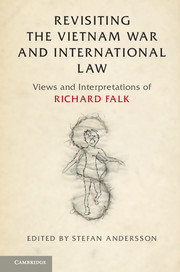Book contents
- Frontmatter
- Dedication
- Contents
- Foreword: The Harmful Legacy of Lawlessness in Vietnam
- Preface
- Acknowledgments
- PART I THE US ROLE IN VIETNAM AND INTERNATIONAL LAW
- PART II WAR AND WAR CRIMES
- PART III THE VIETNAM WAR AND THE NUREMBERG PRINCIPLES
- 9 The Nuremberg Defense in the Pentagon Papers Case
- 10 A Nuremberg Perspective on the Trial of Karl Armstrong
- 11 Telford Taylor and the Legacy of Nuremberg
- PART IV THE LEGACY OF THE VIETNAM WAR
- Index
11 - Telford Taylor and the Legacy of Nuremberg
from PART III - THE VIETNAM WAR AND THE NUREMBERG PRINCIPLES
Published online by Cambridge University Press: 28 December 2017
- Frontmatter
- Dedication
- Contents
- Foreword: The Harmful Legacy of Lawlessness in Vietnam
- Preface
- Acknowledgments
- PART I THE US ROLE IN VIETNAM AND INTERNATIONAL LAW
- PART II WAR AND WAR CRIMES
- PART III THE VIETNAM WAR AND THE NUREMBERG PRINCIPLES
- 9 The Nuremberg Defense in the Pentagon Papers Case
- 10 A Nuremberg Perspective on the Trial of Karl Armstrong
- 11 Telford Taylor and the Legacy of Nuremberg
- PART IV THE LEGACY OF THE VIETNAM WAR
- Index
Summary
Today, “Nuremberg” is both what actually happened there and what people think happened, and the second is more important than the first … it is not the bare record but the ethos of Nuremberg that we must reckon today.
Telford TaylorWe must never forget that the record on which we judge these defendants is the record on which history will judge us tomorrow. To pass these defendants a poisoned chalice is to put it to our lips as well.
Justice Robert H. JacksonIn keeping with Telford Taylor's admonition, the focus of this article is upon “the ethos of Nuremberg” rather than on a reconstruction of the historical record yet again. And this ethos is itself shaped by the unfolding historical setting. The interpretation of the Nuremberg ethos is at the present juncture very much caught up in the global atmosphere brought about by the end of the Cold War. It has been especially shaped by the decision of the United Nations Security Council in 1993 to convene an ad hoc tribunal at The Hague to indict and prosecute individuals accused of war crimes arising out of the breakup of the former Yugoslavia, especially in relation to the war in Bosnia, as well as those associated with the genocidal events occurring in Rwanda during 1994. Almost fifty years passed between the establishment of the Nuremberg Tribunal and the ad hoc arrangements occasioned by the events in the former Yugoslavia and Rwanda. In the intervening period there were many atrocities assuming the form of “crimes against humanity” and even “genocide,” yet no intergovernmental or United Nations initiative ensued. It would seem that the East/West divide precluded the convening of a war crimes tribunal throughout the Cold War, while the absence of strategic conflict in the 1990s has allowed such initiatives. The idea of an international criminal process has even been relied upon as a kind of compensatory undertaking expected to reduce the heat from the public for the failure to mount effective humanitarian interventions to protect the peoples of Bosnia and Rwanda, who were at extreme risk.
- Type
- Chapter
- Information
- Revisiting the Vietnam War and International LawViews and Interpretations of Richard Falk, pp. 300 - 330Publisher: Cambridge University PressPrint publication year: 2017
- 1
- Cited by

